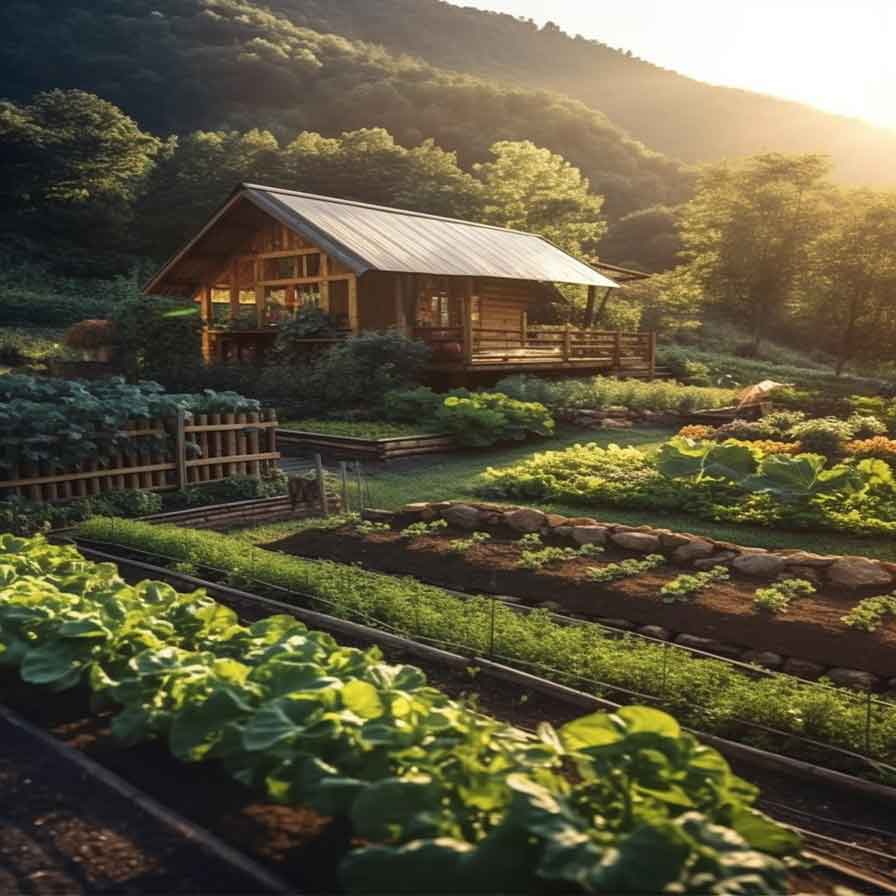The Joys of Growing Your Own Food: Nurturing Health, Connection, and Sustainability
In an age of convenience, where supermarkets offer an abundance of produce year-round, the act of growing your own food might seem like a quaint, old-fashioned pursuit.
However, it’s a practice that not only reconnects us with the earth but also brings a plethora of joys and benefits, both tangible and intangible.
Whether you have a sprawling garden or just a few pots on a balcony, here are the many reasons why growing your own food can be a source of profound satisfaction and well-being.
1. Freshness Beyond Compare
One of the most immediate pleasures of growing your own food is the unparalleled freshness of the harvest. When you pick a ripe tomato from your garden and slice it for a sandwich, the burst of flavor and juiciness is a revelation. The produce you grow is at its peak, packed with nutrients, and untainted by long journeys and storage. This freshness not only enhances the taste but also the nutritional value of your meals.
2. A Connection with Nature
As you tend to your garden or nurture your plants, you develop a deeper connection with nature. You become attuned to the changing seasons, the needs of different plants, and the rhythms of growth and harvest. This connection fosters an appreciation for the environment and a sense of stewardship. Gardening becomes a way to actively participate in the natural world, creating a small oasis of biodiversity in your own backyard.
3. Stress Relief and Mental Well-being
Gardening is often cited as a therapeutic and stress-relieving activity. The act of tending to plants, digging in the soil, and nurturing their growth has a calming effect on the mind. It provides a break from the hectic pace of modern life and allows you to be fully present in the moment. The sense of accomplishment that comes from watching your plants flourish can boost self-esteem and provide a tangible reminder of your ability to nurture and create.
4. Sustainable Living
Growing your own food aligns with sustainable living principles. It reduces the carbon footprint associated with transporting and packaging commercial produce. Moreover, you have control over how you grow your food, which means you can choose organic and environmentally friendly practices. Composting kitchen scraps and using natural pest control methods contribute to a more sustainable and eco-conscious lifestyle.
5. Cost Savings
While there may be an initial investment in seeds, soil, and gardening tools, growing your own food can ultimately save you money in the long run. The yield from a well-maintained garden can provide a significant portion of your daily produce needs, reducing your grocery bills. Additionally, you can save seeds from one season to the next, further cutting costs.
6. Connection to Food Sources
In our modern, urbanized world, many people are far removed from the sources of their food. Growing your own food bridges this gap and gives you a firsthand understanding of the effort and care that goes into producing what you eat. It can inspire a greater appreciation for food and a desire to support local, sustainable agriculture.
7. Variety and Unique Experiences
When you grow your own food, you have the freedom to experiment with a wider variety of fruits, vegetables, and herbs than you might find in a typical grocery store. You can try heirloom varieties, unusual cultivars, and even exotic plants. This culinary exploration can lead to delightful discoveries and unique flavors that enhance your culinary experiences.
8. Sharing and Community Building
A bountiful garden often leads to an abundance of produce. Sharing your surplus with friends, family, or neighbors not only fosters a sense of community but also spreads the joys of homegrown food. It’s a wonderful way to connect with others, strengthen bonds, and share in the satisfaction of nurturing and harvesting together.
9. Personal Growth and Learning
Gardening is a continuous learning process. You’ll encounter challenges such as pests, diseases, and changing weather conditions. Overcoming these obstacles requires problem-solving skills, adaptability, and a willingness to learn. Gardening can be an educational journey that enriches your life and broadens your knowledge.
10. A Source of Pride and Accomplishment
Finally, the act of growing your own food is deeply satisfying on a personal level. There’s a sense of pride and accomplishment that comes from nurturing a seed into a thriving plant and then harvesting the fruits of your labor. This pride extends to the meals you prepare with your homegrown produce, knowing that they are a testament to your skills and efforts.
The joys of growing your own food extend far beyond the garden. It’s a multi-faceted experience that enriches your life in countless ways. Whether you’re a seasoned gardener or a novice with a few pots on a windowsill, the act of cultivating your own food can be a source of profound satisfaction, well-being, and connection with the natural world. It’s a reminder that, in our quest for convenience, there’s immense value in returning to our roots and nurturing the earth.
BONUS
How To Make Money Selling The Food You Grow
Selling the food you grow can be a rewarding way to generate income while doing something you love. Here are three ways to make money from your homegrown produce:
- Farmers’ Markets and Local Food Markets:
- Set Up a Stall: Farmers’ markets and local food markets provide an excellent platform to sell your fresh produce directly to consumers. Rent a booth or stall and display your fruits, vegetables, herbs, and other homegrown items.
- Build a Customer Base: Over time, you can build a loyal customer base who appreciate the quality and freshness of your produce. Engage with customers, offer tastings, and share your knowledge about your products to build trust and rapport.
- Diversify Your Offerings: Depending on what grows well in your region and your gardening expertise, you can diversify your offerings. Consider selling homemade jams, preserves, pickles, or even fresh-cut flowers if you have them.
- Community Supported Agriculture (CSA):
- Create a CSA Program: A Community Supported Agriculture (CSA) program involves selling shares of your harvest to local customers in advance. Participants pay a set fee at the beginning of the season and, in return, receive regular deliveries of your fresh produce throughout the growing season.
- Provide a Variety of Produce: Offer a variety of vegetables, herbs, and fruits to your CSA members. Customize the shares based on the seasonality of your crops, ensuring that participants receive a diverse selection of homegrown goods.
- Build Relationships: CSA programs foster a strong sense of community and direct connection between growers and consumers. Host events like farm tours, workshops, or pick-your-own days to strengthen these relationships.
- Selling to Restaurants and Local Retailers:
- Connect with Local Businesses: Reach out to local restaurants, cafes, and independent retailers to inquire about selling your produce to them. Many businesses value locally sourced, fresh ingredients and may be interested in purchasing from nearby growers.
- Consistent Quality and Supply: To attract and retain restaurant and retailer customers, ensure consistent quality and a reliable supply of your products. Establish clear communication channels, delivery schedules, and pricing agreements.
- Collaborate for Unique Products: Work with chefs or business owners to grow specific varieties or crops tailored to their menu or store offerings. Collaborations like this can lead to niche markets and specialty products.
Remember that successful food sales often require adherence to local regulations, including food safety and labeling requirements. Additionally, marketing your products through social media, local advertisements, or word of mouth can help attract customers and build your reputation as a reliable source of fresh, homegrown food. By combining your passion for gardening with smart business practices, you can turn your homegrown produce into a profitable venture.





